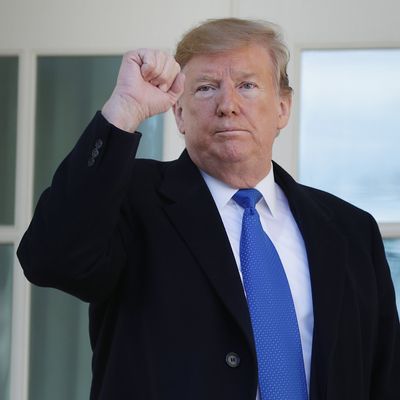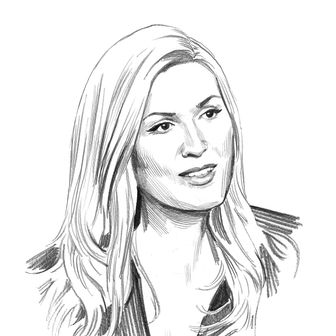
Donald Trump was late, but nearly everyone could see him. On Friday morning, the press was in the Rose Garden for a scheduled 10 a.m. announcement regarding the president’s decision to both sign a bipartisan deal to finance the government and, with fishy justification, declare a national emergency to fund a border wall.
As 10 a.m. came and went, Trump remained in the Oval Office, which I know because there are French doors connecting it to the Rose Garden. Seen through the glass, he appeared to be craning his neck downward, as though reviewing documents or something; a reporter with better eyesight noted that he was holding a binder, and sure enough, there was a binder on the Resolute Desk in a photo posted a few minutes later by Sarah Huckabee Sanders, in which Trump signed the kind of spending deal — one that doesn’t pay for the construction of a border wall, or border barrier, or steel slats, or whatever the term is right now — that he repeatedly said he didn’t want to sign.
When the president finally made it outside, around 10:40, he was reluctant to address the reason anyone was even there. “Before we begin, I’d like to just say that we have a large team of very talented people in China,” he said.
He went on to talk about his administration’s trade negotiations with China and the U.K. for another 324 words, according to the official transcript. He then talked a bit about Syria, a topic he said he’d have “a lot of great announcements” on “over the next 24 hours.” Next, he was onto North Korea and his upcoming summit with Kim Jong-un in Hanoi. “We think that North Korea and Chairman Kim have a tremendous potential as an economic force, economic power,” he said, “Their location between South Korea and then Russia and China — right smack in the middle — is phenomenal.”
Unlike recent Rose Garden events, the president wasn’t relying on a teleprompter. At times, he hardly seemed to be using notes at all. He got around to the topic of his big decision eventually, but when he did, it was like an afterthought. He moved seamlessly from Chairman Kim into the “critical actions” he was taking “to confront a problem that we have right here at home.” He said that he did not need to declare a national emergency, he just wanted to construct the border wall on a faster timeline than he would be able to otherwise, a statement that undercuts the entire premise that there is an emergency at the Southern border, since an emergency, by definition, requires immediate attention. This disconnect did not seem to trouble or even occur to him.
Before it was even really possible to absorb what he was saying about the emergency, he was gone again, a puppy chasing after the squirrel of a new topic: the stock market. And then he was back, talking about the, “tremendous amounts of drugs” on the border, and ultimately the female victims of human trafficking tied up with duct tape around their mouths, a gruesome fantasy he frequently describes when discussing immigration.
As he hit these familiar notes, his exhaustion was palpable. During one 45-second stretch, he ran through the series of events that would follow the conclusion of his remarks. He offered this preview in a sing-song voice, his pitch changing in a rhythm that emphasized his boredom with the inevitable: “So, the order is signed. And I’ll sign the final papers as soon as I get into the Oval Office. And we’ll have a national emergency, and we will then be suuueed! And they will sue us in the ninth circuit! Even though it shouldn’t be there! Aaand we will possibly get a bad roo-ling! And then we’ll get another bad roo-ling! And then we’ll end up in the Supreme Cooourt! And hopefully we’ll get a fair shaaake! And we’ll win in the Supreme Cooourt! Just like the baaan! They sued us in the ninth circuit! And we looost! And then we lost in the appellate divisiooon! And then we went to the Supreme Cooourt! And we wooon.”
A few hours later, the president departed the capital for his vacation home in Florida.






























